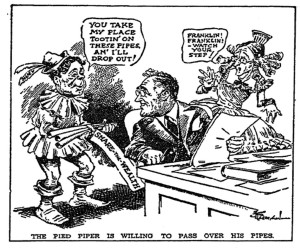“Anachronistic Equivocation”
Nina McCune
I am an unabashed fan of the British monthly History Today’s “Contrarian,” Tim Stanley. I not only like the content of his writing, I like how he writes- straightforward, provocative, thoughtful, and concise. As a teacher of history, I’d like for my students to write like this – flexible and analytic with their content knowledge, limber facility with language, and quickly to the point. In the March issue, Stanley wrote about recent anachronistic references President Obama has made to the “Bull Moose” Teddy Roosevelt and the Progressive reforms of the early 1910s. Stanley cautions, as all historians would, to be mindful of historical specificity and context before drawing such comparisons – they might not fit as neatly into our narrative strategies; they may not fully support our arguments, given that (typically) only one aspect of the entire history is employed.
In sometimes vain attempts to convince my students that history is, in fact, rather relevant to their lives, I have engaged this strategy. In carefully presenting and discussing the New Deal (with an attendant interactive game show, because, you know, we can’t be serious all the time), I recognize an eager want of comparisons to the current republican party primary race. Does Father Coughlin’s call for a Third Party (and a limited review of his radio programs and speeches) really set an analogy for either (a) third parties in general or (b) overtly Christian political candidates? Should we consider the New Deal architecture something that must be dismantled because it clashes with ideologies on the stump (either on the right, claiming it is prime socialist expansion; or on the left, claiming it did not go far enough)? Or, on a lighter side-note, should candidates actually have theme songs? Naturally, such analogies are equally as dangerous (if not more so) than Stanley’s ideas vis-à-vis Obama invoking Teddy Roosevelt; yet they are difficult to avoid when competing for student attention in our focus-on-the-now-media environment.
Yet, the larger “back-story” must live on, unashamed and out of obscurity. Differing from “sound byte” (apropos of Kevin’s Twitter post) history backgrounds that so many of my students bring, I fully encourage enabling students to become more flexible with their content knowledge by exposing them to multiple areas of exploration (even though, it’s like, you know, SO much clicking around on the internet). But – since we are competing for our students’ attention more than ever, and since educators have considered this question for centuries – how can we be sure our students know what they know? How is the process of knowing changing? If we want students to link information successfully and specifically to make historical arguments – how are they learning the material in the first place?
Here, I give you an example of some multi-media bliss that might expound upon one of history’s relative un-knowables: Huey Long. As a potential, viable candidate against FDR for the 1936 (or even 1940) election (although, as I learned from a student this week, he never purchased the domain name “HueyLong1936.com”), Long is as fascinating as he is confounding – and definitely worth looking at. It’s hard to say that “Huey Long is just like politicians today because he was corrupt, wealthy, and liked to bend the rules” and be THAT anachronistic…please consider:
· John Maginnis’ 1984 The Last Hayride, Chapter 1 “The Pirate King” (yes, this is a book, a paper-back, made of paper, book. As far as I can tell, it has not been digitized.)
· Any number of Long’s speeches: (audio) The St. Vitus Dance Government Speech (where he introduces the catchy word “catachresis,” the Veterans of Foreign Wars Speech, or snippits of speeches on YouTube or (print) Long’s famous Share our Wealth Speech (this site also has “Our Growing Calamity,” his “I Told You So” retort, his March 12, 1935 NRA Speech, and others) the Every Man a King radio address,
· There are, of course, websites dedicated to Long as well as documentaries (short ones, like this example, or longer ones by Ken Burns for PBS or Louisiana Public Broadcasting’s excellent Louisiana: A History, DVD 5, chapter 3, “The Kingfish”)
I’m not sure this list is adequate or sufficient to know Huey Long – however, it may provide an interesting set of alternatives for students considering opponents of the New Deal (or at least enough for students to not prevaricate).


